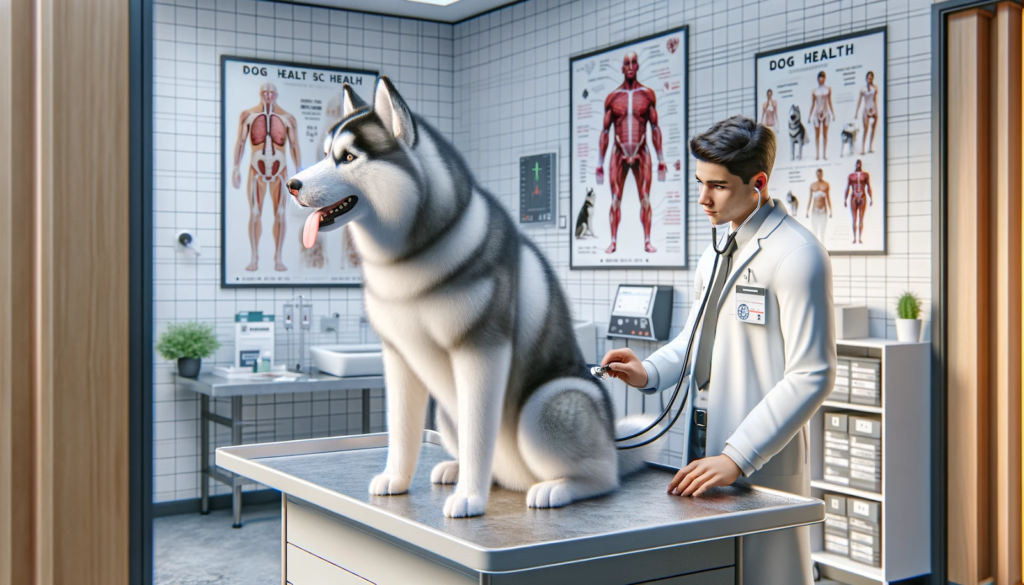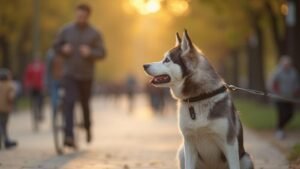Siberian Huskies are generally healthy, resilient dogs — celebrated for their stamina, strength, and hardiness. But like all breeds, they’re not immune to certain genetic or lifestyle-related health conditions.
If you’re a current or future Husky owner, understanding these issues can help you prevent serious problems and improve your dog’s quality of life.
In this article, you’ll learn:
- The most common health issues in Huskies
- Warning signs to watch for
- How to prevent or detect each condition early
1. Hip Dysplasia
A hereditary condition where the hip joint doesn’t form properly, causing painful rubbing and eventual arthritis.
Common Signs:
- Limping after exercise
- Difficulty climbing stairs
- Stiffness when getting up
Prevention:
- Maintain a healthy weight
- Focus on low-impact exercise
- Use joint supplements
- Consider preventive X-rays in adulthood
2. Eye Conditions
Huskies are genetically prone to several eye problems. The most common include:
a) Cataracts
- Cloudy or milky appearance in the eyes
- Can lead to partial or complete blindness
b) Progressive Retinal Atrophy (PRA)
- Gradual retinal degeneration
- Starts with night vision loss, progressing to full blindness
c) Corneal Dystrophy
- More common in females
- Causes cloudy spots on the cornea
Prevention:
- Annual eye exams
- Genetic screening for breeding dogs
3. Hypothyroidism
A hormonal imbalance that affects metabolism and energy levels.
Warning Signs:
- Lethargy or sluggishness
- Hair loss, dandruff, or dry skin
- Weight gain without dietary changes
- Sensitivity to cold
Treatment:
- Daily thyroid medication
- Regular blood tests to monitor hormone levels
4. Zinc-Responsive Dermatosis
Huskies are one of the breeds more likely to struggle with zinc absorption, leading to skin issues.
Symptoms:
- Crusty lesions around the mouth, eyes, and genitals
- Patchy hair loss
- Itching and scabbing
Treatment:
- Zinc supplements prescribed by a vet
- Special diets formulated for zinc absorption
5. Gastric Torsion (Bloat)
A rare but life-threatening condition where the stomach twists, cutting off blood flow.
Signs:
- Swollen, tight, or painful abdomen
- Excessive drooling
- Unproductive vomiting
- Restlessness or sudden collapse
Prevention:
- Feed smaller meals throughout the day
- Avoid intense activity right after meals
- In extreme cases, preventive surgery (gastropexy) may be recommended
6. Epilepsy
Recurring seizures with no identifiable cause, often genetic.
What to Watch For:
- Muscle tremors or spasms
- Loss of consciousness
- Drooling or rigid body during episodes
Treatment:
- Daily medication
- Ongoing veterinary monitoring
Preventive Care by Life Stage
| Life Stage | Recommended Care |
|---|---|
| Puppy (up to 1 year) | Initial exams, vaccinations, balanced diet |
| Adult (1–7 years) | Annual checkups, weight control, physical activity |
| Senior (7+ years) | Twice-yearly exams, joint assessments, bloodwork panels |
When to See a Vet Immediately
Don’t wait — contact your veterinarian if you notice:
- Sudden appetite loss
- Rapid weight change
- Heavy breathing at rest
- Noticeable behavioral changes
- Any signs of pain or lethargy
Early detection can make all the difference.
Final Thoughts: Knowledge = Longevity
Huskies are strong, spirited dogs — but even the toughest companions need care and attention. By staying informed and proactive, you can help your Husky live a long, healthy, and happy life by your side.
Because nothing beats growing older together — one wag, one walk, and one wellness check at a time.






